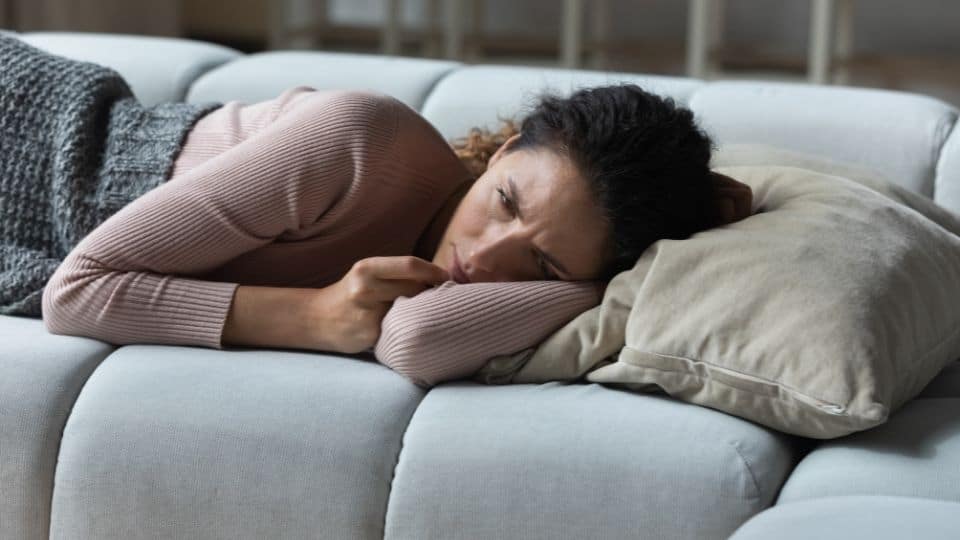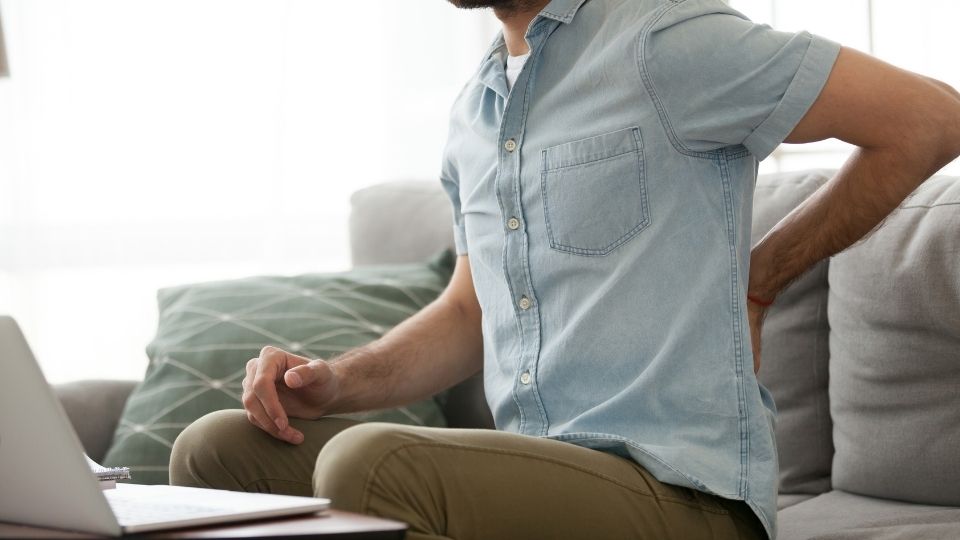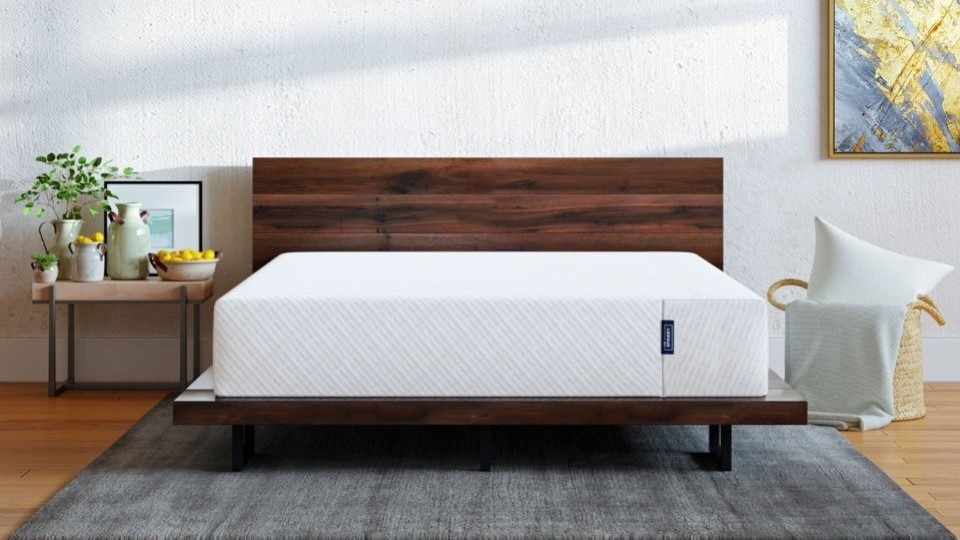If you’ve ever felt a sharp ache in your lower back that gets more intense when lying down, you may be experiencing what’s known as lumbar spine pain. This type of pain is common and can range from mild to severe depending on its underlying cause – something which many people seek medical advice for. In this blog post, we’ll explore the symptoms and causes of lumbar spine pain as well as discuss possible treatments and preventive measures so you know how to look after yourself should the condition arise. Read on to find out more!
As a general rule, back pain that worsens when lying down may be due to a herniated disc, spinal stenosis, muscle strain/sprain, scoliosis, or osteoarthritis. See a doctor for diagnosis and treatment. Avoid lying on your back, and use pillows to support your back and knees when sleeping on your side.
6 Common Causes of Back Pain When Lying Down

Poor Sleeping Position
An incorrect sleeping position can contribute to back pain, especially if you’re lying in a way that causes your spine to be misaligned. Experiment with different positions and consider using pillows to support your body and maintain the natural curvature of your spine.
Inadequate Mattress Support
A mattress that’s too soft or too firm can lead to discomfort and exacerbate back pain. Ensure you’re using a mattress that provides adequate support for your body type and sleeping preferences.
Spinal Misalignment
Spinal misalignment can cause pressure on your nerves and muscles, leading to increased pain when lying down. This can result from poor posture, muscle imbalances, or underlying spinal conditions.
Muscle Strain or Sprain
Overexertion or improper lifting techniques can cause muscle strains or sprains, which can worsen when lying down due to the position of the affected muscles.
Degenerative Disc Disease
As we age, the discs between our vertebrae can wear down, causing pain and discomfort. This degeneration can be exacerbated when lying down due to increased pressure on the affected discs.
Spinal Stenosis | Disc Degeneration
Spinal stenosis occurs when the spinal canal narrows, placing pressure on the spinal cord and nerves. This condition can cause pain that worsens when lying down, particularly in certain positions.
Middle Back Pain When Lying Down | Worse
Middle back pain when lying down can be caused by a number of factors. It could be due to poor posture, an injury, or even a medical condition. Some possible causes include a herniated disc, a pinched nerve, arthritis, or even kidney stones. It’s important to see a doctor to determine the underlying cause and get proper treatment.
Back Pain at Night Cancer
Back pain at night can be a symptom of cancer, but it can also be caused by a number of other factors. Some common causes include poor sleep posture, an uncomfortable mattress or pillow, or a spinal condition such as degenerative disc disease or spinal stenosis. If the pain is persistent and accompanied by other symptoms, it’s important to see a doctor to rule out any serious underlying conditions such as cancer.
Lower Back Pain Worse When Lying Down or Sitting | Disc Degeneration Worse
Lower back pain that worsens when lying down or sitting can be caused by a variety of factors, including spinal stenosis, degenerative disc disease, or a herniated disc. Poor posture and muscle strain can also contribute to this type of pain. It’s important to see a doctor to determine the underlying cause and develop a treatment plan.
Why Does My Lower Back Hurt When I Lay Down on My Back
Lower back pain when lying on your back can be caused by several factors, including a herniated disc, spinal stenosis, or muscle strain. It may also be due to poor posture or an uncomfortable mattress. Stretching exercises, pain medication, and physical therapy can help alleviate the pain, but it’s important to see a doctor to determine the underlying cause and get proper treatment.
Why Does My Back Hurt When I Lay Down Flat | Upper Back | Nighttime Back
Back pain when lying flat can be caused by a number of factors, including muscle strain, spinal stenosis, or a herniated disc. It may also be due to poor posture or an uncomfortable mattress. Stretching exercises, pain medication, and physical therapy can help alleviate the pain, but it’s important to see a doctor to determine the underlying cause and get proper treatment.
7 Treatment Options for Back Pain When Lying Down
Adjust Your Sleeping Position
Finding a comfortable sleeping position that supports your spine can help alleviate back pain. Experiment with different positions and use pillows to support your neck, knees, and hips.
Invest in a Supportive Mattress
A high-quality mattress that provides appropriate support for your body type and sleeping preferences can help reduce back pain when lying down.
Practice Good Posture
Maintaining proper posture throughout the day can help prevent spinal misalignment, which can contribute to back pain when lying down.
Stretch and Strengthen Your Upper Back Muscles
Regular exercise, including stretching and strengthening exercises targeting your core and back muscles, can help alleviate back pain by improving your overall musculoskeletal health.
Over-the-Counter Pain Relief
Non-prescription pain relievers, such as ibuprofen or acetaminophen, can provide temporary relief for back pain. However, it’s essential to consult your healthcare provider before beginning any new medication.
Physical Therapy
A physical therapist can create a customized treatment plan to address your specific back pain issues, which may include exercises, manual therapy, and other modalities to alleviate pain and improve function.
Medical Intervention
In some cases, back pain that worsens when lying down may require medical intervention, such as injections, medication, or surgery. Always consult with your healthcare provider to determine the most appropriate course of action for your situation.
5 Prevention Tips for Back Pain When Lying Down
Maintain a Healthy Weight
Excess weight can place additional strain on your spine, leading to increased pain when lying down. Maintaining a healthy weight through diet and exercise can help alleviate this pressure.
Practice Proper Lifting Techniques
When lifting heavy objects, use your legs and engage your core muscles to minimize the strain on your back. Avoid twisting or bending at the waist, and instead, pivot with your feet to change direction.
Incorporate Ergonomics into Your Daily Routine
Ensure your workspace is set up ergonomically, with your chair and desk adjusted to promote proper posture. Regularly changing positions and taking breaks throughout the day can also help prevent back pain.
Prioritize Sleep Hygiene | Night
Create a sleep environment that promotes relaxation and restorative rest. This includes maintaining a consistent sleep schedule, keeping your bedroom cool and dark, and avoiding stimulants and electronics close to bedtime.
Manage Stress
Chronic stress can contribute to muscle tension and back pain. Incorporate stress-reduction techniques, such as meditation, deep breathing exercises, and mindfulness, into your daily routine to help alleviate tension and promote relaxation.
Summary
Sitting certainly has its risks as many of us can suffer from sciatica pain while taking a seat. Understanding why it’s happening is the best way to find relief and prevent further damage. Because it could take weeks, months or even years before we know what the underlying cause may be, it is important to keep track of our symptoms. We should talk to a doctor if the pain gets worse over time or if any accompanying symptoms arise. Rest, gentle physical activity and possibly medicines are some of the most common ways to address sciatica flare-ups. Lastly, finding an ergonomic chair that is designed for comfort and good back support can also be helpful in reducing sciatic pain from sitting. By staying informed and proactive with our health, we can keep track of any sudden changes in our bodies and minimize the risk of aggravating existing issues like sciatica pain!








